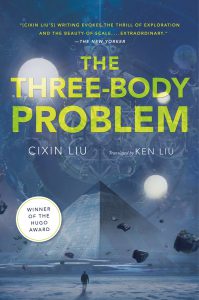
The Three Body Problem by Cixin Liu, Trans. Ken Liu (Remembrance of Earth’s Past #1)
Genre: Science Fiction
Publisher: Tor Books on November 11, 2014
Source: Purchased
![]()
![]()
The Three-Body Problem is the first chance for English-speaking readers to experience this multiple award winning phenomenon from China’s most beloved science fiction author, Liu Cixin. View Spoiler »
![]()
![]()
![]()
Get ready y’all, because it’s CONTROVERSIAL OPINION TIME.
Let me just get this out of the way right now: no one is more disappointed than I am that I didn’t like this book. Chinese science fiction with two interconnected narratives and a police procedural vibe? I should’ve loved this like virtually everyone else did (especially since I enjoyed Cixin Liu’s short fiction in Invisible Planets). But sadly I did not.
THE THREE BODY PROBLEM is, firstly, an incredibly dense read. There’s rarely a page that goes by that doesn’t discuss physics problems, issues in theoretical frontier science, or make reference to famous physicists. What should be an absolute page-turner is completely bogged down by what I felt was the author’s attempt to school the masses (i.e. me) on the beauty of hard science, an opinion that was only strengthened by the author’s note at the end of the novel. Obviously there are many readers out there who heard this message and it spoke to them, but unfortunately I found it quite pretentious and somewhat impenetrable at times.
The basic plot of THE THREE BODY PROBLEM is as follows:
In one narrative, young astrophysicist Ye Wenjie is blackballed during the Cultural Revolution and essentially forced to work on a top-secret military base that claims to study satellites. In the second narrative, nano materials researcher Wang Miao is tapped by an international task force to infiltrate an elite club of scientists to discover how they’re connected to the rash of suicides among prominent scientists across the globe. Sounds intriguing, right? It was at first, but the plot kept getting sidelined for tens of pages of dialogue about physics theory. Puzzling out how the two stories are connected was fun, but despite the high stakes for both Ye and Wang I found it difficult to connect to them as characters.
Ye is at least a sympathetic character, after her horrible experiences during the Cultural Revolution. Her grief in the wake of her father’s execution, her ardent environmentalism and concern for China’s forests, and her tenacity all made Ye someone I could root for. I found myself looking forward to her next set of POV chapters as soon as they ended…although that may be because I loathed Wang’s POV chapters. When he begins to guess at the conspiracy behind everything going on, Wang completely loses it and scares the crap out his wife and kid – then he doesn’t spare them a thought for the rest of the novel. No, instead he spends his emotional energy waxing poetic about the love he had for a brilliant and beautiful scientist whom he had literally never spoken to before. Honestly, his narration felt a bit too gentleman’s club-y and borderline sexist for me to enjoy it at all.
I see why other readers love this book – it has some pretty epic reveals and plot twists, and discusses some pretty high level moral ideas – but I am not in agreement. It’s not until about the 60% mark of THE THREE BODY PROBLEM that these exciting events occur, and I found it difficult to stay engaged up until that point. If I hadn’t been buddy reading this with Becky, I probably would’ve put it aside unfinished.
All that said, I am happy that I’ve read more Chinese science fiction, and I do plan to read more in the future…it just won’t be those novels written by Cixin Liu.